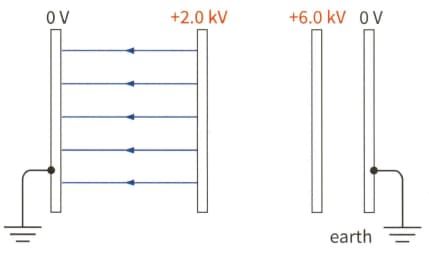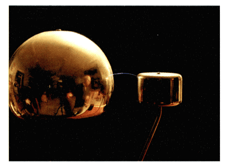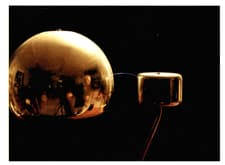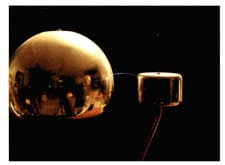David Sang and Graham Jones Solutions for Chapter: Uniform Electric Fields, Exercise 3: Questions
David Sang Physics Solutions for Exercise - David Sang and Graham Jones Solutions for Chapter: Uniform Electric Fields, Exercise 3: Questions
Attempt the practice questions on Chapter 21: Uniform Electric Fields, Exercise 3: Questions with hints and solutions to strengthen your understanding. Physics for Cambridge International AS & A Level Coursebook 3rd Edition Digital Access solutions are prepared by Experienced Embibe Experts.
Questions from David Sang and Graham Jones Solutions for Chapter: Uniform Electric Fields, Exercise 3: Questions with Hints & Solutions
Figure shows an arrangement of parallel plates, each at a different voltage. The electric field lines are shown in the space between the first pair. Copy and complete the diagram to show the electric field lines in the other two spaces.

An arrangement of parallel plates.
Calculate the electric field strength at a point where a charge of $20 \mathrm{mC}$ experiences a force vertically downwards of $150 \mathrm{~N}$.
Calculate the electric field strength between two parallel charged plates, separated by $40 \mathrm{~cm}$ and with a potential difference between them of $1000 \mathrm{~V}$.
An electron is situated in a uniform electric field. The electric force that acts on it is $8 \times 10^{-16} \mathrm{~N}$. What is the strength of the electric field? (Electron charge $e=1.6 \times 10^{-19} \mathrm{C} .$ )
Air is usually a good insulator. However, a spark can jump through dry air when the electric field strength is greater than about $40000 \mathrm{~V} \mathrm{~cm}^{-1}$. This is called electrical breakdown. The spark shows that electrical charge is passing through the air-there is a current. (Do not confuse this with a chemical spark such as you might see when watching fireworks; in that case, small particles of a chemical substance are burning quickly.)
A Van de Graaff generator (Figure) is able to make sparks jump across a $4 \mathrm{~cm}$ gap. Estimate the voltage produced by the generator?

Air is usually a good insulator. However, a spark can jump through dry air when the electric field strength is greater than about $40000 \mathrm{~V} \mathrm{~cm}^{-1}$. This is called electrical breakdown. The spark shows that electrical charge is passing through the air-there is a current. (Do not confuse this with a chemical spark such as you might see when watching fireworks; in that case, small particles of a chemical substance are burning quickly.)
The highest voltage reached by the live wire of a conventional mains supply is $325 \mathrm{~V}$. In theory (but DO NOT try this), how close would you have to get to a live wire to get a shock from it?

Air is usually a good insulator. However, a spark can jump through dry air when the electric field strength is greater than about $40000 \mathrm{~V} \mathrm{~cm}^{-1}$. This is called electrical breakdown. The spark shows that electrical charge is passing through the air-there is a current. (Do not confuse this with a chemical spark such as you might see when watching fireworks; in that case, small particles of a chemical substance are burning quickly.)
Estimate the voltage of a thundercloud from which lightning strikes the ground $100 \mathrm{~m}$ below.

